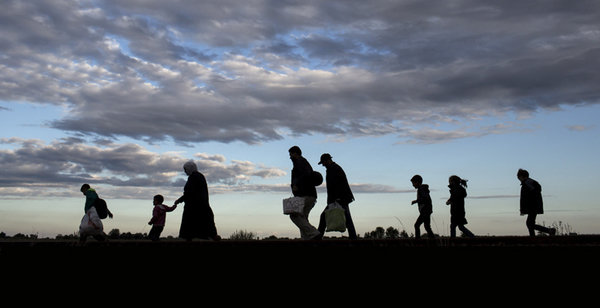Lost Potentials? The Rights and Lives of the Excluded

The MPI for Social Law and Social Policy contributed with an interdisciplinary project to the research initiative The Challenges ofMigration, Integrationand Exclusion. The project "Lost Potentials? The Rights and Lives of the Excluded" aimed at gaining insights into the legal and political factors that create and solidify mechanisms of exclusion. To this end, a legal analysis of the relevant legal provisions that create a spectrum of possibilities and restrictions for different types of migrants in Germany was conducted as well as an empirical survey study that allows comparing the relevance of these degrees of exclusion for integration. The latter entailed collecting representative data on both documented and undocumented migrants in order to create an empirical basis for comparison.
The Challenges of Migration, Integration and Exclusion was a 3-year research initiative (2017-2020) financed by the Max Planck Society and led by Prof. Dr Marie-Claire Foblets (Max Planck Institute for Social Anthropology, Halle/Saale) and Prof. Dr Ayelet Shachar (at that time Max Planck Institute for the Study of Religious and Ethnic Diversity, Göttingen). This collaborative project involved researchers from six Max Planck Institutes: Max Planck Institute for Comparative Public Law and International Law (Heidelberg), Max Planck Institute for Demographic Research (Rostock), Max Planck Institute for Social Law and Social Policy (Munich), Max Planck Institute for Human Development (Berlin), Max Planck Institute for Social Anthropology (Halle) and Max Planck Institute for the Study of Religious and Ethnic Diversity (Göttingen).
In debates on migration to Europe, and Germany in particular, researchers as well as policy makers have placed a great deal of emphasis on pathways to successful integration of immigrants and asylum seekers into the host societies. This project placed a stronger focus on patterns and mechanisms of exclusion. To this end, the project participants have developed a comprehensive research design which is:
- Multidisciplinary: The project brought together migration researchers from a broad variety of disciplines: law, demography, public health, economics, social anthropology, political science sociology, and history.
- Multi-perspective: The project investigated exclusion from the perspectives of a number of different actors at the level of state agencies (the European Union, the receiving nation-states, the countries of origin), non-governmental actors, as well as the immigrants themselves.
- Multidimensional: Instead of viewing inclusion and exclusion merely as opposite and mutually exclusive pathways, the project took a more comprehensive approach with a focus on the temporal dimension, following immigrants through the different stages of the migration process, from their initial decision to leave their country of origin to their arrival in the European Union and legal statuses they go through, right up to the moment a final decision (permission to stay, return to country of origin, etc.) has been reached and executed. The research assessed not only the changes in legal statuses, but also the links between legal statuses on the one hand, and socio-economic conditions, health, and various cultural factors, on the other. The project elaborated these different dimensions as well as their interdependencies and interactions.
The project had three clearly defined overarching objectives:
- To provide in-depth studies of the various mechanisms that effectively exclude immigrants at the different stages of the migration process, with a focus on four main areas, namely legal status, socio-economic conditions, health status, and identification with ‘emotional communities’;
- To identify the consequences of those exclusion mechanisms both for immigrants and for members of the majority societies;
- To elaborate alternative pathways that might help prevent the marginalizing effects of exclusion (especially those that raise concerns about respect for human rights), particularly with a view to policy relevance.
Picture above: Reuters / Marko Djurica
Publikationen
Results
Position Paper (German)
Legal Terms and Definitions
An overview of different legal terms and definitions, prepared by Dr. Constantin Hruschka and Tim Rohmann, is available here: PDF
Data Collection
In 2019, the Institute conducted a survey on the expectations of migrants. Further information is available here.
Participating Institutes
1. Max Planck Institute for Comparative Public Law and International Law
Project: Decisions on exclusion and inclusion in the EU and beyond
Principal Investigator: Prof. Dr Armin von Bogdandy
2. Max Planck Institute for Demographic Research/Population Europe
Project: Gender differences in health and mortality by ethnic background – a register-based study.
Principal Investigator: Dr Anna Oksuzyan
Project: Undocumented migrants and irregular workers in Germany: policy challenges and approaches 1950-2019
Principal Investigator: Dr Daniela Vono de Vilhena
Project: Vanishing health advantage of migrants over time and across generations
Principal Investigator: Dr Silvia Loi
3. Max Planck Institute for Human Development
Project: Refugees and the creation of emotional communities
Principal Investigators: Prof. Dr Margrit Pernau and Dr Benno Gammerl
4. Max Planck Institute for Social Anthropology
Project: Belonging nowhere or everywhere? Somali return migrants in East Africa
Principal Investigator: Dr Tabea Scharrer
Project: Migrants’ exclusion in a fragmented, international, legal environment
Principal Investigator: Dr Luc Leboeuf
5. Max Planck Institute for Social Law and Social Policy
Project: Lost potentials? The rights and lives of the excluded
Principal Investigators: Dr. Christian Hunkler and Dr. Romuald Méango
6. Max Planck Institute for the Study of Religious and Ethnic Diversity
Project: The inclusion-exclusion continuum: asylum-seekers and the social implications of legal statuses and conditions in Germany
Principal Investigator: Dr Miriam Schader



